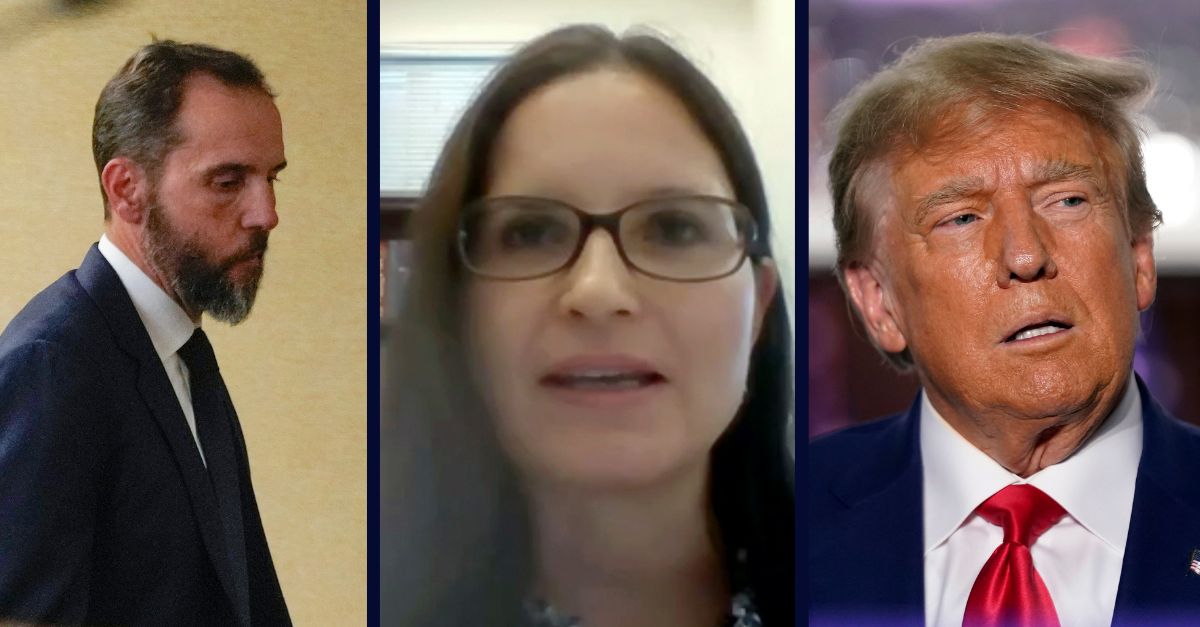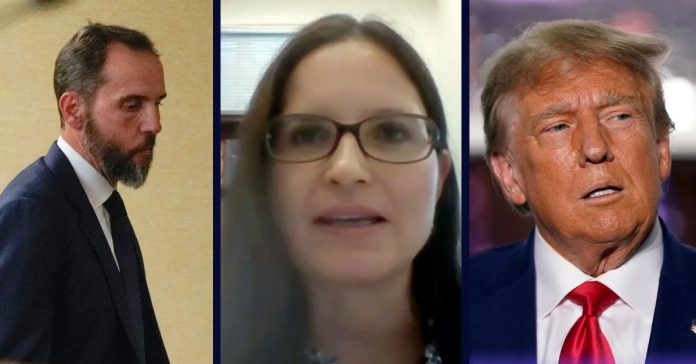
Left to right: Special counsel Jack Smith arrives to speak about an indictment of former President Donald Trump, Aug. 2023. (AP Photo/Jacquelyn Martin)/U.S. District Judge Aileen Cannon during remote Senate Judiciary Committee nomination hearing. (U.S. Senate via AP)/Former President Donald Trump speaks at Trump National Golf Club in Bedminster, N.J. June 2023. (AP Photo/Andrew Harnik, File)
Special counsel Jack Smith on Friday urged the federal judge overseeing the Mar-a-Lago classified documents case to enforce certain redactions on two court filings recently submitted by former President Donald Trump’s valet Waltine “Walt” Nauta.
Nauta faces charges of conspiracy to obstruct, making false statements to the FBI, and withholding documents — connected to an alleged scheme to delete Mar-a-Lago camera footage and conceal boxes of classified documents from a grand jury. In reply briefs, he argued the indictment should be thrown out because he was singled out via vindictive prosecution and impermissibly retaliated against via prosecution because he declined to testify in front of a grand jury.
On Wednesday, Smith’s office addressed several alleged substantive and procedural deficiencies in Nauta’s arguments, categorizing them as “deeply flawed” and “meritless” and simply filed too late.
The government’s Friday filing asks U.S. District Judge Aileen Cannon to intervene in a dispute over whether Nauta can publicize the names of potential government witnesses and other information.
“The Government has conferred with counsel for all three defendants concerning this Motion, and they maintain that the Government has not met its burden to support restricting public access to the two reply briefs,” the special counsel’s five-page motion explains.
According to the filing, defense attorneys and Cannon were also emailed so-called “red box” versions of the two Nauta reply briefs if the government’s “extensive” proposed redactions are accepted.
“First, beginning on page two of the Reply and continuing through page four, Nauta references, summarizes, and quotes from filings that this Court has ordered sealed,” the motion argues, in reference to the vindictive prosecution-based reply. “The Government does not object to the Court unsealing these docket entries, but until it does so, these portions of the Reply must be redacted.”
Smith also complains that Nauta’s attorneys are trying to expose information about two separate sealed grand jury proceedings.
“Nauta references a sealed grand jury proceeding in the District of Columbia that occurred as part of this investigation, and that involved another client of his counsel,” the filing goes on. “Nauta references a sealed grand jury proceeding in the District of Columbia that involved a third client of his counsel, but that was unrelated to this case.”
The government argues the second grand jury proceeding has nothing to do with the present case because of the order of events.
“Notably, the events Nauta described occurred before the appointment of the Special Counsel,” the government’s motion continues. “Neither the undersigned nor any other line prosecutor working on the classified documents investigation had any involvement in that proceeding, nor would they have been aware of it when it occurred.”
In the vindictive prosecution reply, Nauta allegedly uses the names of “potential” government witnesses, Smith says.
This issue, of course, has been a consistent theme throughout pretrial filings in the case. Cannon has been heavily criticized by the prosecution and a steady stream of legal and political pundits for her tentative decisions signing off on publishing witnesses’ names.
In the Friday filing, Smith references the ongoing feud between the government on one side and the court and defense on the other, briefly arguing that “witness safety and privacy are paramount pretrial.”
The special counsel’s office also objects to another recent filing submitted by Trump’s co-defendant.
“Throughout Nauta’s Motion to Suppress Reply, he includes the names of Government witnesses,” the filing says. “The Government is seeking to redact their names and any pronouns revealing their gender. For the reasons stated above, the Government has satisfied its burden for these limited redactions.”
Have a tip we should know? [email protected]

